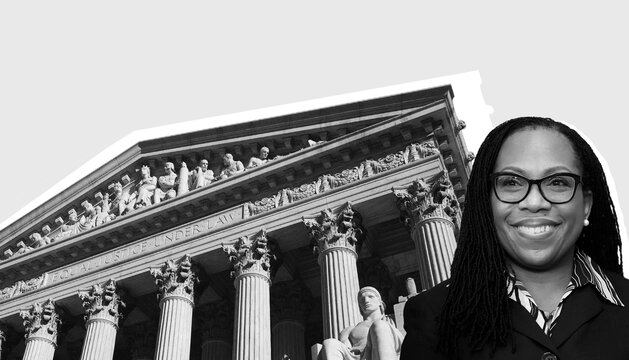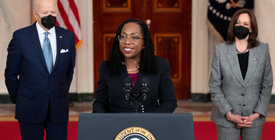
What Biden’s SCOTUS Nominee Will Face
The Supreme Court’s first black woman nominee will likely face a disproportionate number of questions on such issues as affirmative action, voting rights, law enforcement practices, and judicial activism.

Part of
This article first appeared in The Bulwark on February 18th, 2022.
We do not yet know who President Biden’s Supreme Court nominee will be, but there are two things we know for sure. The first is that she will be a black woman, the fulfillment of a Biden campaign promise. The second is that those two descriptors—black and woman—will play an outsized role in her confirmation hearing and the future of the Court.
To the first certitude, an official slate of candidates has not been released, but the White House confirmed it is focusing on four unnamed potential nominees. The consensus seems to be that judges Ketanji Brown Jackson and Leondra Kruger are on the list, along with Michelle Childs, the favored candidate of her fellow South Carolinians Rep. James Clyburn and Sen. Lindsey Graham.
To the second thing we know—well, we did not have to wait long to know it. Before the dust had settled on Justice Stephen Breyer’s retirement announcement, Biden’s yet-to-be-named nominee was labeled “lesser qualified,” a recipient of an affirmative action handout, and an “offensive” quota choice. These were not personal slights, as there was no person to whom they could be directed. Instead, they cast aspersions on groups of people—women and black people—and on the legitimacy of the confirmation process. The Senate hearing has no date, but the political theater began immediately. And the sensational mix of race, gender, and hyperpartisanship was all that was needed for the typical characters to seek out the spotlight.
While the confirmation hearings may well have dramatic moments, race and gender are more likely to figure into the proceedings in subtler ways. At least that’s what precedent teaches us: that race and gender will dictate the types of questions the nominee will be asked, the bulk of them fixated on topics typecast as women’s issues or black concerns.
In their 2011 paper “May It Please the Senate,” law professor Lori Ringhand and political scientist Paul Collins analyzed all the questions asked by senators and responses given by nominees in every Supreme Court confirmation hearing from 1939 (when Felix Frankfurter became the first nominee to be questioned in a public hearing) through 2009 (ending with Sonia Sotomayor). Ringhand and Collins demonstrate empirically “that women and minority nominees face a significantly different hearing environment than do white male nominees.” When the nominee is a racial or ethnic minority and/or a woman, the senators tended to put aside the cordial chatter more quickly and get down to business, to ask more substantive questions, and to focus more intently on the nominee’s judicial philosophy and positions on civil rights and criminal justice.
This last point is critical. Scholars have long noted female and minority candidates are often saddled with a “presumption of incompetence.” It is the sort of view that leads people to immediately declare such candidates lesser qualified, a position situated snugly between the soft bigotry of low expectations and the overtly racist notion that a group is naturally inferior. Given that there are no constitutionally mandated qualifications and no impartial set of standards by which to assess whether a Supreme Court nominee is suitable for the bench, the presumption is not grounded in any objective evaluation of the merits. Rather, the confirmation process is inherently subjective and susceptible to the winds of politics.
As such, nominees are qualified when the Senate says so, which means partisanship and political ideologies determine whether responses to hearing questions are deemed acceptable. And when a woman or person of color is in the hot seat—as was the case five times during the period Ringhand and Collins examined in their original 2011 paper—those nominees’ views on racial and gender discrimination and their judicial philosophy tend to receive disproportionate attention. Minority nominees (Marshall, Thomas, and Sotomayor) were asked a third more questions on their judicial philosophy than white nominees, and female nominees (O’Connor, Ginsburg, and Sotomayor) were asked a quarter more than male nominees. On criminal justice, minority nominees get more than twice as many questions as white nominees. Moreover, these effects were even more pronounced when the nominees were questioned by members of the opposing party. And in the one instance to date when the nominee was a minority woman (Sotomayor), Ringhand and Collins, along with political scientist Christina Boyd, observed in a 2018 paper that she “received a higher percentage of judicial philosophy questions than the average for all other categories nominees to the Court—white, minority, male, and white female,” with Republicans asking her nearly twice as many questions as Democrats on how she interprets the Constitution.
• • •
So, what does this mean for the black woman who will soon face a confirmation hearing? It means she can expect to receive a disproportionate number of questions from Judiciary Committee Republicans—all but one of whom are white men—on her judicial philosophy, issues of racial and gender discrimination, and criminal justice. And given the professional histories of the apparent top three nominees—Brown-Jackson, Kruger, and Childs—the line of questioning that might be most aggressively pursued for each nominee seems immediately obvious.
Brown-Jackson, a current federal judge on the D.C. Circuit Court, spent a couple of years as a public defender, served on the U.S Sentencing Commission, and had an incarcerated family member.
Kruger, presently a justice on the California Supreme Court, has notable decisions overturning death penalty sentences, protecting rights of the accused, and access to police bodycam footage.
And Childs, who is a federal district judge in South Carolina, has issued decisions that made absentee voting easier and recognized the constitutional right to same-sex marriage a year before the Supreme Court did, though her time representing corporations in labor disputes has recently drawn some negative attention from progressives.
Considering these profiles alongside the increasingly toxic polarization of the parties and the centrality of identity politics in our political discourse, questions on such issues as affirmative action, voting rights, law enforcement practices, and judicial activism are likely to dominate. Though Republicans will probably tread carefully in their questioning to avoid feeding perceptions of racial and gender intolerance, the national stage that comes with these confirmation hearings can be catnip to those with presidential aspirations—such as Sens. Ted Cruz and Josh Hawley, both on the Judiciary Committee. So the questions on how the nominee applies the Constitution to civil rights and criminal justice issues will surely be pointed and contentious at times.
What remains to be seen is how responsive the nominee will be to such questions. In a forthcoming paper updating their analysis, Ringhand and Collins show that Donald Trump’s nominees—Neil Gorsuch, Brett Kavanaugh, and Amy Coney Barrett—dodged or declined to answer more questions than any nominees in the last fifty years. The Democrats’ edge in the Senate is razor-thin, so a responsive posture by the nominee in hopes of padding confirmation chances with a few Republican supporters in the Senate is more likely. But should she decline to answer more questions than she responds to, we will see the extent to which a double standard exists.
Assuming the nominee is successful, more consequential than this confirmation hearing will be the historic moment when she is seated. Not only will it hold tremendous symbolism, particularly for the women forcibly excluded from the Fifteenth and Nineteenth Amendments, it will be the first time in the nation’s history that the majority of justices are not white men: There will be four women justices, two black justices, and one Hispanic justice. While the ideological balance will not change—the conservative side maintaining its 6–3 advantage—the Court’s legitimacy may well face new challenges if, for example, controversial opinions on civil rights are issued with white men comprising the dissent. Further, what will it mean if the progressive wing of the Court made up of three women—one black, one Hispanic, and one Jewish—is consistently on the losing side, their constitutional interpretation on issues of civil rights and criminal justice routinely defeated?
Long after the hearing has concluded and we have a Court that looks more like America than it ever has, our newest Supreme Court justice will require the nation to confront a fundamental question: Will the country revere and protect our system of government when the face of democracy is radically different from its founding?
More from the Ketanji Brown Jackson SCOTUS Nomination collection
-
A Public Defender on the High Court
Ketanji Brown Jackson will be the first public defender to serve on the Supreme Court. Here’s why it matters. -
-
Competing Visions of Patriotism on Display at Ketanji Brown Jackson Hearings
Amid the inquiry into Jackson’s fitness to become the first Black woman on the Supreme Court, American patriotism was on trial.




